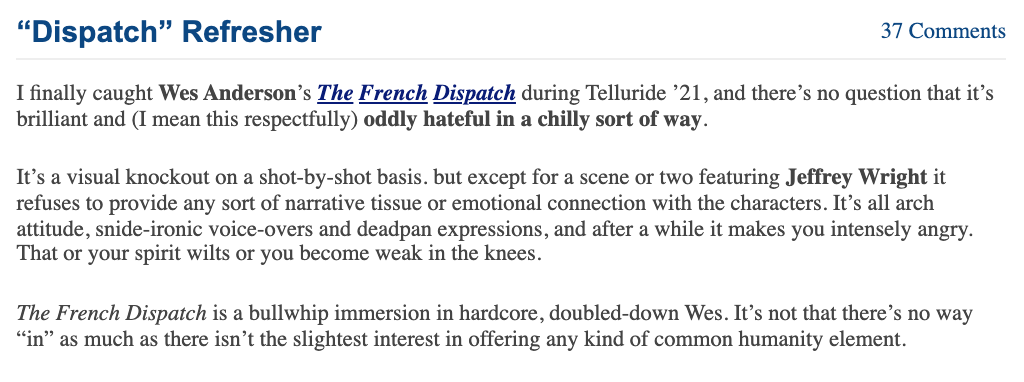I reviewed Wes Anderson‘s Asteroid City (Focus Features, 6.16) in Cannes just over three weeks ago. It’s opening tomorrow so I may as well re-post. I’ve said at least a dozen times that Wes doesn’t seem to want to expand or deepen his artistic reach. He makes standard issue WesWorld movies, and he’s going to stick to the brand and that’s that. Take it or leave it.
Posted on 5.23.23: Wes Anderson‘s Asteroid City (Focus Features, 6.16) would almost certainly be “another signature tableau exercise in WesWorld irony — zero emotion, wit, whimsy, staccato dialogue, a darkly humorous attitude, etc.”
Add in the other familiar signatures — formal framings, immaculate and super-specific production design, etc. — and that’s pretty much what Asteroid City is…quelle surprise!
Having been a conflicted Anderson fan for over 25 years and an Anderson friendo since ’94, it breaks my heart to say this once again, but Asteroid City is a whole lotta fun to splash around in, eye-bath-wise, but there’s almost nothing going on except the Anderson troupe reciting their lines just so.
Immaculate style (in this instance ’50s kitsch) mixed with bone-dry humor and not much else.
Yes, Asteroid City features a meaningless, blink-and-you’ll-miss-it Scarlett Johansson nude scene (nothing remotely close to that buck naked Lea Seydoux posing-for-Benicio del Toro scene in The French Dispatch).
And a delightful musical sequence featuring some wonderful Oklahoma!-like polka dancing, performed by Maya Hawke and Rupert Friend.
And a cartoonish, silly-looking alien with 1950s Warner Bros. animation department bug eyes who, in 1955, twice pays a visit to Asteroid City, the small-town site of a Junior Stargazers convention. Except the alien does nothing (no threats or love or anything in between) and has nothing to say or to teach like Michael Rennie did four years earlier…zip.
The song-and-dance sequence, which ignites with the joyful spirit of choreographer Agnes DeMille, indicates that Wes feels real affection for musicals. Perhaps if he had filmed Asteroid City as a sung-through opera?
But of course, he didn’t and probably couldn’t. Because (and again, it really hurts to say this) he’s been wrapped so tightly in his WesWorld aesthetic — dry sardonic humor, deadpan line readings, somber philosophical musings — that he can’t seem to bust out of it or has lost interest in doing so or whatever.
Remember when Wes’s characters went through actual human difficulties and occasionally expressed emotion? The kind you could relate to, I mean? Certainly in Bottle Rocket (Luke Wilson‘s glorious love for Inez, the motel maid) and Rushmore (romantic obsession, jealous rage) and more recently in Grand Hotel Budapest (bittersweet nostalgia for a certain elegant, old-world way of life that’s been washed away by time).
What is Asteroid City attempting to deal with, metaphorically or adult-behavior-wise or what-have-you?
The best I can figure is that it’s about complacency — several highly attuned, obviously intelligent characters who are, of course, nominally aware of the alien’s visit and are taken aback by this world-shaking event but can’t say or deduce or conclude anything of substance. Nothing means nothing, but they sure are surrounded by a lot of drop-dead southwestern nothingness (fake mesas in the distance, a huge tourist-attraction crater), and the film sure is an eyeful to look at. It’ll probably give you an occasional chuckle or, more likely, an LQTM moment.
“Restating Anderson Basics,” posted on 12.14.21: Of course I love Wes Anderson creations…of course I do! It’s just that many of my Anderson faves are his commercials, and those dozens upon dozens of YouTube parodies. Feature-wise I’ve always been and will always be fully respectful of Anderson’s brand or stylistic stamp, and that includes, believe it or not, The French Dispatch, which I had a mostly unpleasant time with at Telluride last September.
But I am a genuine, whole-hearted fan of only a handful of Wes’s films — Rushmore (which I’ve always adored like a brother), Bottle Rocket, The Grand Budapest Hotel, the original black-and-white Bottle Rocket short, most of The Royal Tenenbaums. But I dearly love the Wes signage, specifically the shorts and parodies. The SNL Anderson horror film short is heaven.
I will always be on Team Anderson, and I will never resign. Partly because I’m 100% certain that one day he’ll reach into his heart and decide to broaden his scope, or perhaps even re-think things somewhat. (Wes is still relatively young.) He has to — artists have no choice. I just hope and pray he’ll make more of an effort to blend his hermetic Wesworld aesthetic with the bigger, gnarlier, more complex world that’s been there all along.



Posted on 9.24.07: “Anderson is obviously one of the most distinctive signature filmmakers working today. He can solve his problem by simply crawling out of his own rarifed ass and exposing himself to some form of raw, unruly, Hemingway-esque experience — a life without stuffed African animals or spur-of-the-moment train trips to Rome or specially tailored seersucker suits.
Comment from HE reader “JD”, posted in 2007: “Anderson’s characters (like Anderson himself and possibly his audience) are trying to hide from their very real, adult pain in the surface comforts and curiosities of childhood… in essence, he makes children’s movies and/or fairy tales for adults with an interest in art films, literature, and rock ‘n’ roll. If you ask me, that’s an incredibly bold and original approach and one that is certainly worth revisiting in different genres/narrative contexts.”
Posted by “Milk Man,” posted on 9.24.07: “Don’t get me wrong — the man is a great filmmaker and one of the preeminent tastemakers of the current targeted demographic, but there is no there there. It’s just the fact the he’s so fixed and rigid that makes me kind of itchy. I feel the same way about Tarantino. Both of them are obviously madly in love with their calculated public images. But in the end it’s not about them, or it shouldn’t be. It’s about the movies. And whether or not the movies can survive the endless self-love of the men who created them remains to be seen.”
